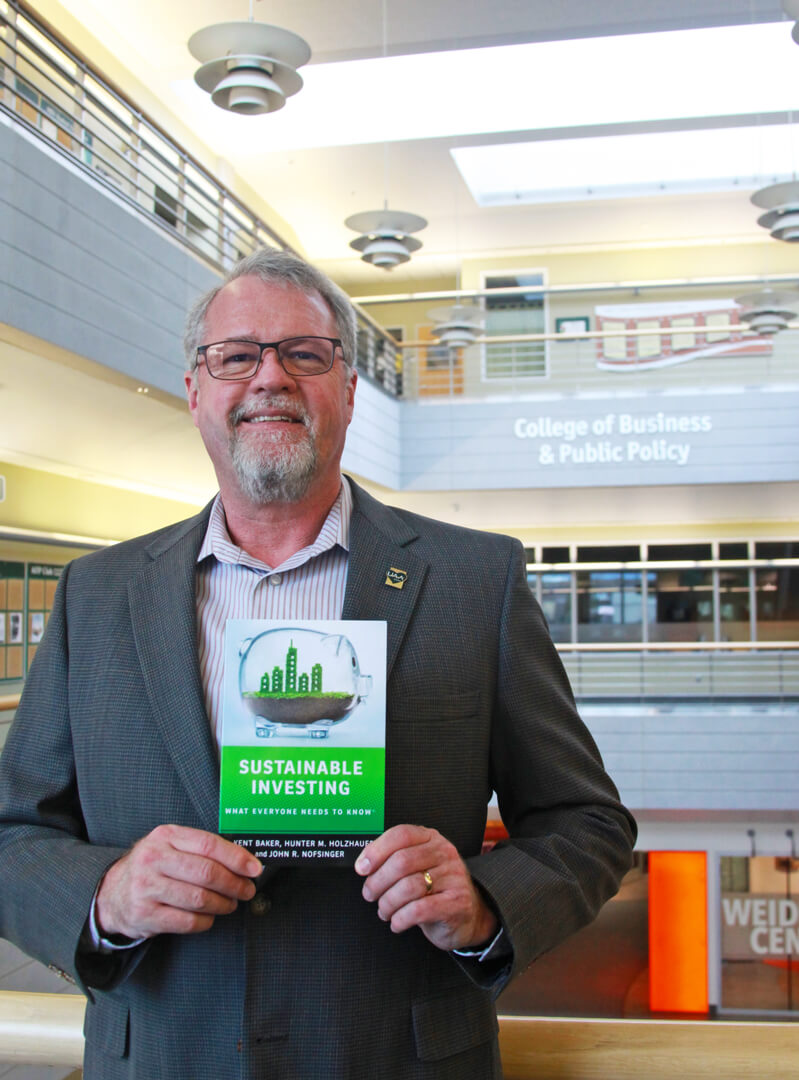On Writing and Publishing Books: A Q&A With Dr. John Nofsinger
May 3, 2022Dr. John Nofsinger is the William H. Seward Chair in International Finance, Dean of the College of Business and Public Policy, and prolific author of textbooks, scholarly books, and investing guides that speak to a general audience.
Sustainable Investing, his 15th book, was released this week. It explores an approach to investing that encompasses making money and doing good by taking into account environmental, social and governance-related (ESG) insights.
With so many titles to his credit, we asked Dr. Nofsinger for some insight on his experience with publishing, collaboration, feedback he’s received, and changes to the industry.
When did you publish your first book?
2001. Investment Madness: How Psychology Affects Your Investing…and What to Do About It, Financial Times Prentice Hall.
At the time, there was an infomercial and book called Stop the Insanity! By Susan Powter. It was about health and fitness. I wanted to call my book Investor Insanity. I was overruled by the editor and Investment Madness became the title.
How did it feel to see your name on a published book for the first time?
Holding your first book is very emotional. It takes a lot of work to finish a book and a lot of patience to get it published. A lot of pent-up feelings are released as you flip through the pages. During the next year, you do silly things like stop at bookstores when you travel to see if they have your book on the shelf.
A decade later, when I had several more books published, I was traveling in Germany and decided to stop at a bookstore to see if they had any of my books. They had one. I was amazed and elated.
The next coolest thing is to see your book in Chinese, Spanish, Polish, Arabic, or any other language. For me, my name on the front was the only thing I could read!
How many books have you published?
Sustainable Investing, 2022, is my 15th book. My 16th book, an investment textbook, will be coming out in the fall. All of my books are about finance. That includes corporate finance, investments, socially responsible finance, and psychological and biological influences on financial decision making.
What type of readers enjoy your books?
I think of my books in three categories, trade books, textbooks, and scholarly books. Trade books are for the general populace. People that have an interest in learning the subject enjoy these books. Textbooks are for students and instructors. Students likely never ‘enjoy’ their textbooks. Scholarly books are for researchers in the field wanting to know the most update to date work in the field. These books are often used for doctoral seminars.
What is some of the feedback you’ve received?
Feedback comes in many forms and can be very rewarding and humbling.
Examples include:
- My books are better than any business card. People whom I have never met seem to know me.
- When ‘famous’ people in your field contact you and want to use your book in their class.
- Being contacted out of the blue by someone who wants to translate a book into Bulgarian, or Thai.
- Having a book cited over 740 times (Google Scholar) in other people’s scholarship.
- Winning a book award: Finalist in Business: Personal Finance/Investing category of the 2020 Best Book Awards sponsored by American Book Fest for The Biology of Investing.
- Having my mother-in-law rave about some of my books and send them to her relatives.
How do you get ideas for a new title? Do you ever run out of ideas?
I wrote some of my books because I am passionate about the subject. I had followed the topic for years and felt there needed to be a useful book for a specific target audience (the public, students, or scholars). In other instances, colleagues suggested book ideas to me. If I am interested in the topic, I will write it with them. If I’m not enthusiastic about it, then I will pass. Honestly, I have more ideas and opportunities than I have time to pursue. I guess that is why co-authoring makes sense for me at this point.
Do you have collaborators for all your books?
My first two books were single authored. Afterward, they have all been co-authored.
What is the key to success when co-authoring with others?
I think that once my name was established as an author, other people wanted to work with me. In other cases, I wanted to work with certain people. The best author team has people that prioritize the project and have different but complementary skills. For example, one author might be creative and often work outside the box, while the other is organized and a good writer. If both are knowledgeable about the topic and understand that their difference will make the book better, it should work well. I have had projects fail because a co-author never found the time to work on the book.
What advice do you have for professors who want to break into book publishing?
Write about something you are passionate about. Also, find a need that your book will fill. You will need to convince a publishing company to invest in your book. If you can’t pitch it to them, they won’t be able to sell it.
Have you noticed any major changes in the industry since you first began publishing? For example – does technology make the process smoother, or does the popularity of social media put more of a marketing burden on you?
One change is the marketing expectations of the author. To persuade a publisher to publish your book, you may need to convince them that you have a platform for selling it. The platform could include social media and the number of followers you have, the size of the classes you teach, willingness to be interviewed, and more.
